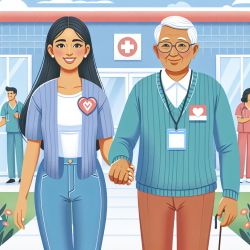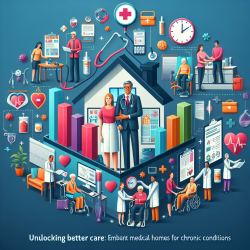Introduction
In a rapidly aging society, the need for support systems that ensure older adults receive adequate healthcare is more pressing than ever. The research article "Can volunteer medical visit companions support older adults in the United States?" explores a promising solution: volunteer medical visit companions (MVCs). This study highlights the potential of MVCs to bridge the gap in healthcare accessibility for older adults who lack family support. As practitioners, understanding and implementing the findings of this research can lead to improved patient outcomes and a more inclusive healthcare system.
The Power of Volunteer Companions
The study conducted by Sheehan, Blinka, and Roth (2021) delves into the roles and acceptability of volunteer MVCs in accompanying older adults to medical visits. Through focus groups with volunteers and recipients, the research identifies key benefits and areas for improvement in the MVC program.
- Improved Attendance: Many older adults reported missing medical appointments before accessing MVC services. The presence of a companion not only ensures attendance but also reduces anxiety associated with medical visits.
- Enhanced Patient Experience: Volunteers provide more than just transportation. They assist with paperwork, offer emotional support, and sometimes accompany patients into consultations, enhancing understanding and communication.
- Community Engagement: The program fosters a sense of community and purpose among volunteers, many of whom report personal benefits such as improved mental health and satisfaction from helping others.
Implementing Research Findings in Practice
For practitioners looking to enhance their service delivery, integrating MVCs into healthcare practices can be transformative. Here are some actionable steps based on the research findings:
- Develop Training Programs: Training is crucial for volunteers to effectively support patients. Programs should cover confidentiality, communication skills, and basic medical knowledge to prepare MVCs for their roles.
- Expand Volunteer Roles: Encourage volunteers to take on additional responsibilities, such as accompanying patients into medical consultations, where appropriate. This can improve patient comprehension and adherence to medical advice.
- Foster Community Partnerships: Collaborate with local organizations to recruit and train volunteers. Community involvement can enhance the reach and impact of MVC programs.
- Evaluate and Adapt: Continuously assess the effectiveness of MVC programs through feedback from both volunteers and patients. Use this data to refine training and support structures.
Encouraging Further Research
While the current study provides valuable insights, further research is needed to explore the long-term impact of MVCs on healthcare outcomes and to identify best practices for program implementation. Practitioners are encouraged to contribute to this growing body of research by sharing their experiences and findings.
Conclusion
Volunteer medical visit companions have the potential to significantly enhance the healthcare experience for older adults. By implementing the findings of this research, practitioners can create more supportive and effective healthcare environments. To read the original research paper, please follow this link: Can volunteer medical visit companions support older adults in the United States?










